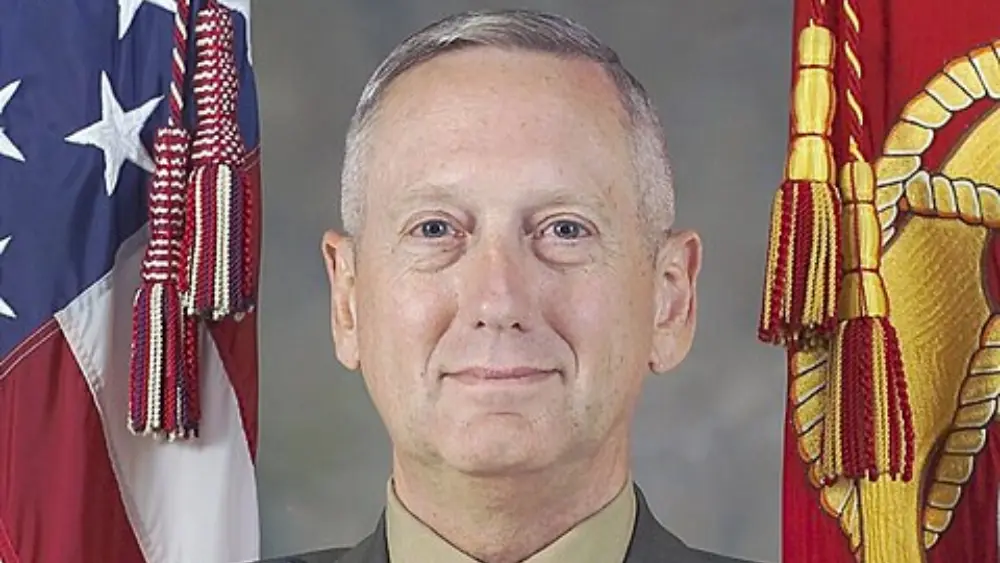James Norman Mattis, born on September 8, 1950, served as the U.S. Secretary of Defense from 2017 to 2019.
As a former four-star U.S. Marine Corps general, he supervised troops in Afghanistan, Iraq, and the Persian Gulf Wars.
Having graduated from Central Washington University, Mattis joined the U.S. Marine Corps through the Naval Reserve Officers’ Training Corps.
A Military Trailblazer
As the 26th Secretary of Defense, James Mattis led the U.S. military as the head of the joint force. The United States Joint Forces Command, the Supreme Allied Command for Transformation of NATO, and the U.S. Control Center. Over 200,000 soldiers, sailors, airmen, coast guardsmen, Marines, and other partner troops were under his command at U.S. Central Command throughout his time there.
From 2010 until 2013, he led U.S. Central Command, with Admiral Bob Harward as his deputy commander. After leaving the military, he held several positions in the commercial sector, including one as a General Dynamics board member.
Mattis strongly supported the American-led world order based on democracy, human rights, free trade, and collective security. He advocated for maintaining U.S. global leadership and alliances with NATO, Japan, South Korea, and others. Viewing Russia, China, Iran, and North Korea as threats to this order, he clashed with Trump’s isolationist stance and skepticism toward alliances.
It includes the decision to leave the Iran nuclear deal and the military withdrawals from Afghanistan and Syria. The Hill claims that Mattis allegedly talked Trump off trying to kill Syria’s ruler Bashar al-Assad.
Early Life and Military Career of James Mattis
Mattis is the son of merchant mariner John West Mattis (1915–1988) and Lucille Mattis. His mother, born in Canada but emigrated to the United States as a child, had served in Army Intelligence in South Africa during World War II. In order to work at a facility that supplied fissile material to the Manhattan Project, Mattis’s father relocated to Richland, Washington.
He earned his high school diploma from Richland in 1968. In 1971, he graduated from Central Washington University with a Bachelor of Arts in History. Furthermore, he earned a Master of Arts in international security issues from the National War College of the National Defense University in 1994.
As a first lieutenant and then captain, Mattis received a series of minor unit commands. He led the Marine Recruiting Station in Portland, Oregon. Following another promotion to lieutenant colonel, he traveled to the Persian Gulf for Operation Desert Shield. There, he oversaw the 1st Battalion, 7th Marine Regiment, during the Persian Gulf War.
A Colonel’s Path to Edson’s Eagles
Mattis’ unit, part of the 1st Marine Division’s Regimental Combat Team 7 (RCT-7), swiftly entered Kuwait. When promoted to colonel, he received Edson’s Eagles, an esteemed honor symbolizing the fighting spirit of Marine Raider commander Merritt (“Red Mike”) Edson. Having earned a Bronze Star for valor, Mattis proudly wore Edson’s Eagles from 1995 until his promotion to brigadier general in 1997, later passing the insignia to another colonel.
James Mattis’ Pivotal Moments in Iraq
Major General Mattis oversaw the longest continuous overland advance in U.S. Marine Corps history while commanding the 1st Marine Division in the early stages of the Iraq War.
The division returned to the country late in 2003. The following year, he was redeployed to Iraq, where Mattis oversaw the U.S. Marine assault on Al-Falljah. After receiving his third star in May 2004, Mattis was sent to the Marine Corps Combat Development Command at Quantico, Virginia.
He collaborated with American personnel there as he attempted to share the lessons acquired in Afghanistan and Iraq with the troops on the ground. According to Army General David Petraeus, Field Manual 3-24 is a thorough counterinsurgency manual.

Melody of Military Leadership
General Mattis oversaw combat deployments in the company, battalion, regiment, brigade, division, force, and theatre levels throughout his 43 years in the U.S. Marine Corps.
This includes leading the 1st Marine Expeditionary Brigade during Operation Enduring Freedom’s campaign in Afghanistan and the 1st Marine Division’s 2003 invasion of Iraq.
The pinnacle of his military career came during his three years as the Commander of U.S. Central Command. He supervised cooperative operations in Afghanistan and Iraq and played a crucial role in defining U.S. strategy toward Iran.
James Mattis as the Warrior Monk
Due to his single status and lifelong dedication to combat study, he earned the nickname “The Warrior Monk.” With 7,000 volumes in his collection, he avidly reads and urges every American to read Marcus Aurelius’ Meditations.




